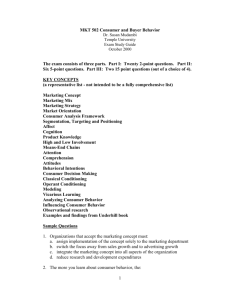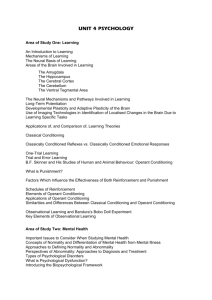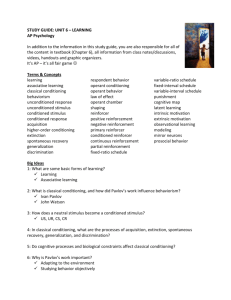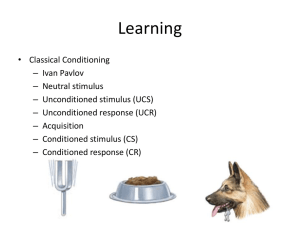Syllabus
advertisement
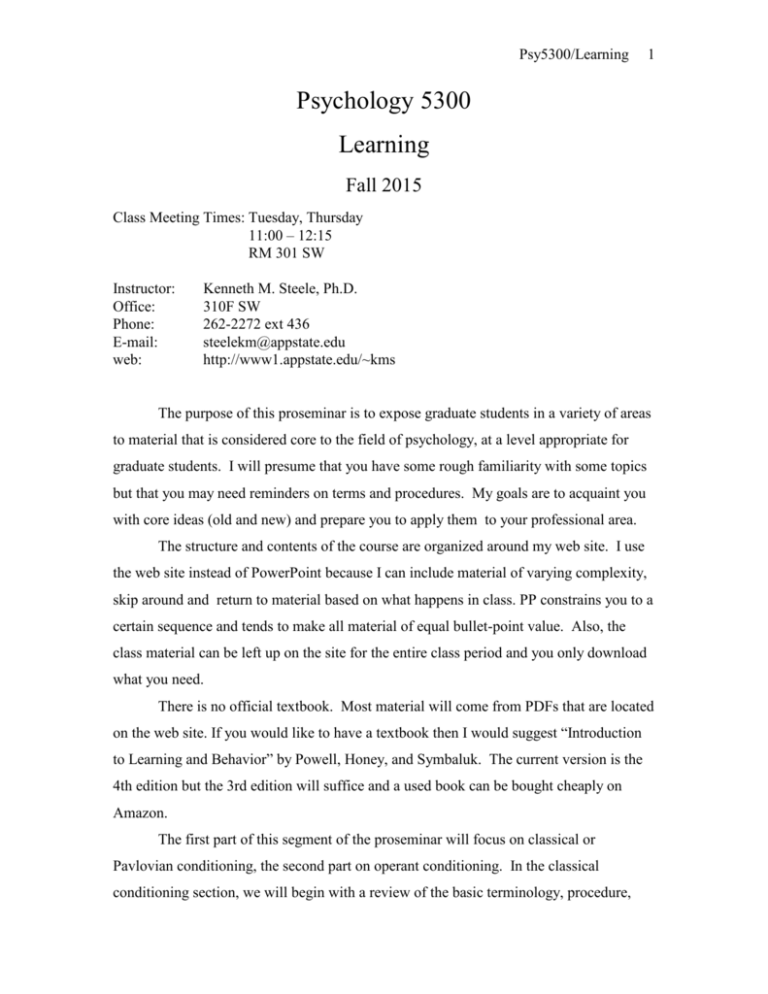
Psy5300/Learning 1 Psychology 5300 Learning Fall 2015 Class Meeting Times: Tuesday, Thursday 11:00 – 12:15 RM 301 SW Instructor: Office: Phone: E-mail: web: Kenneth M. Steele, Ph.D. 310F SW 262-2272 ext 436 steelekm@appstate.edu http://www1.appstate.edu/~kms The purpose of this proseminar is to expose graduate students in a variety of areas to material that is considered core to the field of psychology, at a level appropriate for graduate students. I will presume that you have some rough familiarity with some topics but that you may need reminders on terms and procedures. My goals are to acquaint you with core ideas (old and new) and prepare you to apply them to your professional area. The structure and contents of the course are organized around my web site. I use the web site instead of PowerPoint because I can include material of varying complexity, skip around and return to material based on what happens in class. PP constrains you to a certain sequence and tends to make all material of equal bullet-point value. Also, the class material can be left up on the site for the entire class period and you only download what you need. There is no official textbook. Most material will come from PDFs that are located on the web site. If you would like to have a textbook then I would suggest “Introduction to Learning and Behavior” by Powell, Honey, and Symbaluk. The current version is the 4th edition but the 3rd edition will suffice and a used book can be bought cheaply on Amazon. The first part of this segment of the proseminar will focus on classical or Pavlovian conditioning, the second part on operant conditioning. In the classical conditioning section, we will begin with a review of the basic terminology, procedure, Psy5300/Learning 2 and effects. We will then move on to current work and ask the following general questions. In what situations do we expect to see classical conditioning in effect? Are there different kinds of classical conditioning? What events will function as conditioned stimuli? What events will function as unconditioned stimuli? Can a stimulus function as a conditioned stimulus and an unconditioned stimulus or is it restricted to only one role? What form will the conditioned response take? The second part covers operant conditioning, and will focus on the Law of Effect. We will begin with Thorndike’s introduction of the Law of Effect as an explanatory principle. The Law of Effect has been seen by many as providing a universal principle to explain learning. We will read from both proponents and opponents of this assumption. Next we will examine the critical issue of predicting when some event will function as a reinforcer. This will lead us into some strange material, be forewarned. The goal is to give you flexibility in choosing among possible reinforcers. The third part introduces Operant-Pavlovian interactions in conditioning. Typically, the two types of conditioning are taught as separate topics as if they existed in isolation. In actual situations, both types of conditioning are in operation. We will examine a couple of cases which are important theoretically and practically. Most of the text for which you are responsible consists of excerpts from articles and books. These articles are on located on my web site in Adobe pdf format. Notice that there are a lot of articles. Some are there should you want or need to find out additional information. I will alert you how to approach the material as we proceed through this section of the class. There are two exams, one on classical conditioning and the other on operant conditioning. These will be some type of essay exams, the details of which will depend on what happens in class. Generally they will ask whether you understand the material in two ways, concise explication and application to a practical situation. You will have fair warning of the contents of the exam because I will post a study guide as we get close to the exam date. New this year are a series of 10 short assignments. They are designed to get you to think about and use the terminology/ideas. The combination of the 10 assignments is worth 100 points. Each test will be worth 100 points and your final grade is computed Psy5300/Learning from the average of the three. Plus and minus grades are assigned for averages that are within 2 points of the next grade (e.g., 90 and 91 = A-; 88 and 89 = B+). Class participation counts in several ways. The more you talk, the better I know what you do and don’t know. The more you talk, the better (fairer, more valid) I can make the exams. So don't be afraid to ask questions or make comments. Psychology 5300 - Fall 2015 Course Sequence Date Day Assignment 8/18 T Class Goals Class Requirements 8/20 R Concept(s) of the Reflex Readings: Pavlov (1927) Lecture I, Skinner (1931) Assignment 1: Descartes vs. Pavlov/Skinner 8/25 T Pavlov's Definition of Reflex Basic Acquisition Effects Assignment 2: Spot Acquisition Procedures in Daily Life 8/27 R Discuss Assignment 9/1 Classical Conditioning I: Extinction T Do we need a concept of inhibition? Assignment 3: 9/3 R No Class - Convocation 9/8 T Classical Conditioning II: Predicting the CS Contiguity vs. Contingency 9/10 R Classical Conditioning III: Predicting the UCS Pavlov - Biological Potency Kamin Blocking Effect 3 Psy5300/Learning 9/15 T Classical Conditioning III: Predicting the Response Opponent Process Theory Assignment 4: Diet Coke I 9/17 R Discussion of Diet Coke I Assignment 5: Diet Coke II Swithers (2015) 9/22 T Discussion of Diet Coke II 9/24 R Evaluative Conditioning: Classical Conditioning or Not? 9/29 T Q&A 10/1 R Test 1 10/6 T Thorndike codifies the Law of Effect 10/8 T J. B. Watson and E. R. Guthrie against the Law of Effect C. L. Hull for the Law of Effect 10/13 T Problems for the Need-Drive Hypothesis The Prediction Issue: Two classic solutions Transituational Law of Effect - Paul Meehl Empirical Law of Effect - B. F. Skinner Assignment 6: 10/15 R Fall Break - No Class 10/20 T Practice with Skinner's Empirical Law of Effect Assignment 7: Positive Reinforcement Tutorial 10/22 R Discussion of Assignment 10/27 T Reinforcement Schedules 10/29 R "Reinforcement ""Value"" Multiple Schedules - Behavioral Contrast Concurrent Schedules - Matching 4 Psy5300/Learning 11/3 T Back to the Prediction Issue: Premack's solution 11/5 R The Prediction Issue: Timberlake & Allison's solution Response Deprivation Theory Assignment 8: 11/10 T Discussion of Assignment 11/12 R Operant-Pavlovian Interactions I Two-Factor Theory 11/17 T Conditioning & Phobias Field (2006) Assignment 9: 11/19 R Psychonomic Society Meeting - No Class 11/24 T Operant-Pavlovian Interactions II Learned Helplessness 11/26 R Thanksgiving Break - No Class 12/1 T Learned Helplessness & Environmental Psychology Assignment 10: 12/3 R Summary / Q & A 12/10 R Test 2, Noon-2:30 5




